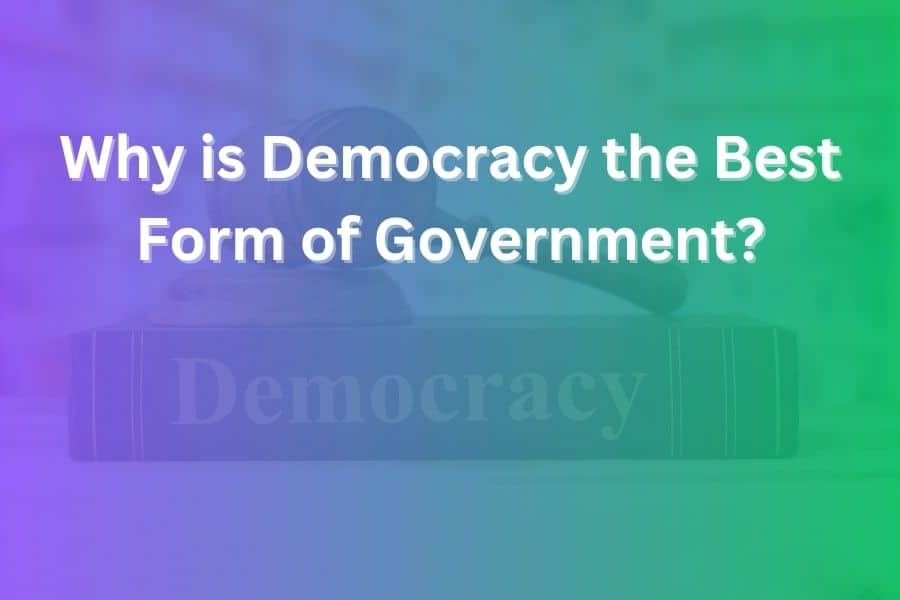
Democracy is often described as the best form of government because it gives you a voice, allows you to choose your leaders, and protects your rights. Unlike systems where power rests in the hands of a few, democracy empowers ordinary people to shape their country’s direction.
It thrives on freedom, equality, and participation — values that build trust between citizens and leaders. In this article, you’ll learn why democracy stands out among other forms of government, how it safeguards your rights, encourages progress, and sustains long-term stability in society.
What Makes Democracy Different from Other Systems
In a democracy, you are not ruled by one person or a small group who decides everything. Instead, the power belongs to the people. You participate through elections, civic discussions, and public decision-making.
Governments like autocracies or dictatorships limit your influence and often silence opposition. Democracy, on the other hand, ensures accountability because elected officials must earn your support and face consequences when they fail.
This people-centered system keeps leaders humble and responsive. It prevents concentration of power that often leads to corruption or abuse. By making leaders answerable to citizens, democracy maintains a balance that no other political system achieves as effectively.
Freedom of Speech and Expression Strengthens Democracy
One of democracy’s most vital features is the right to speak your mind. Freedom of speech allows you to criticize government policies, demand justice, and propose new ideas. This open exchange of opinions fuels innovation and encourages solutions to national challenges.
When citizens freely share ideas, leaders gain valuable insights. This helps them make decisions that represent a wider range of interests. In contrast, governments that restrict speech often face unrest and social tension because people feel unheard. Democracy, however, builds trust and unity by allowing everyone’s voice to matter.
Equal Rights and Fair Representation for Everyone
Democracy is built on equality — the belief that every person deserves the same rights and opportunities. Whether you’re rich or poor, educated or not, your vote carries the same weight as anyone else’s. This equality gives you a sense of ownership over your country’s destiny.
Representation ensures that different communities and social groups have a voice in shaping policies. In the United States, for example, local, state, and federal elections allow people to influence decisions at every level. Democracy’s structure makes it possible for diverse opinions to come together and guide national progress.
Transparency and Accountability Promote Trust
Trust in government grows when you can see how decisions are made. Democracy thrives on transparency, meaning leaders must operate in the open. Laws, budgets, and public decisions are accessible for scrutiny, and independent media helps hold power accountable.
If leaders misuse their authority or act against public interest, they can be voted out or investigated. This accountability gives you confidence that your government serves you — not itself. In contrast, authoritarian systems often hide information, leading to mistrust, inefficiency, and widespread corruption.
Democracy Encourages Economic Growth and Innovation
A democratic environment nurtures creativity and entrepreneurship. When you have the freedom to start businesses, invent new products, or express fresh ideas, the economy flourishes. Studies consistently show that democracies tend to have higher per capita income and greater stability than authoritarian regimes.
In the U.S., where democratic institutions are strong, innovation drives the economy forward — from technology to healthcare. By protecting intellectual property and promoting fair competition, democracy creates an atmosphere where you can dream, take risks, and prosper.
Education Flourishes in Democratic Societies
Democracy and education go hand in hand. A well-educated society strengthens democracy by producing informed citizens who understand their rights and responsibilities. When you have access to education, you can make better decisions about who to vote for, what policies to support, and how to improve your community.
Democratic governments often invest more in education because they recognize its role in building informed voters. Education also promotes tolerance and empathy, reducing the risk of social conflict. The result is a more united and progressive society.
Protection of Human Rights and Personal Freedoms
Democracy safeguards your fundamental rights — including freedom of religion, speech, and assembly. These rights ensure that you can live without fear of persecution or oppression. Independent courts and strong legal systems protect these freedoms, providing a safety net against discrimination and abuse.
In countries without democracy, human rights violations often go unchecked because citizens have little power to resist. But in a democratic system, you can challenge injustice through elections, protests, or legal action. This constant push for fairness strengthens the moral foundation of society.
Peaceful Transfer of Power Ensures Stability
In democratic nations, power changes hands through elections, not violence. This peaceful transfer prevents chaos and promotes stability. When leaders know they will eventually be replaced, they focus more on leaving a positive legacy rather than clinging to power.
For you as a citizen, this process guarantees consistency and predictability. You can trust that the system will continue functioning smoothly even when governments change. Stable governance helps attract foreign investments, promotes economic growth, and keeps the country secure.
Democracy Gives You a Voice in Shaping the Future
Your voice matters in a democracy. Whether through voting, volunteering, or civic engagement, you help shape policies that affect your life. Participating in elections or local initiatives gives you ownership over your community’s direction.
This sense of involvement makes people care more about their surroundings. It encourages you to be proactive in solving issues like climate change, healthcare, and education. The result is a society where citizens and government work together toward shared goals rather than against each other.
Rule of Law Protects Justice and Equality
Democracy operates under the rule of law — meaning everyone, including leaders, must follow the same rules. This principle prevents power abuse and ensures fairness in society. Courts, independent agencies, and watchdog organizations play vital roles in maintaining this system.
When laws apply equally, you can rely on justice to protect your rights. The consistency of the legal system under democracy reassures citizens that fairness is not just a promise but a practiced reality.
Media Freedom Strengthens Democratic Accountability
A free press is one of democracy’s strongest allies. Journalists act as watchdogs, exposing corruption, misinformation, and government failures. When the media operates independently, it keeps you informed and empowers you to make thoughtful decisions.
In contrast, authoritarian regimes control media narratives and limit access to truth. Democracy, however, thrives when information flows freely. Transparency through media strengthens your ability to question power and demand better leadership.
Social Progress and Inclusion Under Democracy
Democracy evolves with society. It adapts to new challenges, allowing reforms that expand equality and inclusion. Movements for civil rights, women’s rights, and LGBTQ+ rights in the U.S. demonstrate democracy’s power to grow and correct itself.
When you live in a democracy, your participation can drive meaningful change. Through voting and advocacy, marginalized voices find representation, and outdated laws can be replaced with fairer policies. This ability to adapt keeps democracy relevant across generations.
Democracy Fosters International Cooperation
Democratic nations often cooperate more peacefully with each other. They share common values like freedom, fairness, and respect for human rights. These shared beliefs build trust and reduce the likelihood of wars between democratic countries.
For example, alliances such as NATO and international organizations like the United Nations thrive on democratic principles. They promote diplomacy, collective security, and humanitarian aid. As a citizen, you benefit from a world where democracies support global stability.
Challenges That Strengthen Democracy Over Time
Even the best systems face challenges, and democracy is no exception. Corruption, voter apathy, or misinformation can weaken its structure. However, one of democracy’s greatest strengths is its ability to correct itself. You have the power to demand transparency, reforms, and better governance.
Modern democracies continuously evolve to meet new challenges like climate change, inequality, and digital privacy. With active participation, you help democracy stay strong, responsive, and fair for future generations.
Why Democracy Remains the Best Choice for Society
At its heart, democracy is about trust — trust in people’s ability to make decisions that shape their lives. It thrives because it respects individuality while promoting collective well-being. You are free to express yourself, dream big, and hold your leaders accountable.
Democracy’s balance of power, rule of law, and inclusivity creates stability unmatched by other systems. While no democracy is perfect, it offers the best chance for fairness, progress, and freedom. When citizens like you stay informed and engaged, democracy remains not just a system of government but a way of life that defines modern civilization.
Conclusion: Your Role in Protecting Democracy
Democracy is only as strong as the people who uphold it. By voting, staying informed, and defending truth, you help preserve the freedoms that define it. The system thrives on your participation, your voice, and your courage to demand fairness.
When you engage with your community, support transparency, and hold leaders accountable, you ensure democracy continues to serve everyone — not just a few. Its power lies in collective action, compassion, and a shared commitment to justice. By valuing democracy, you secure a brighter, freer, and fairer future for all.








